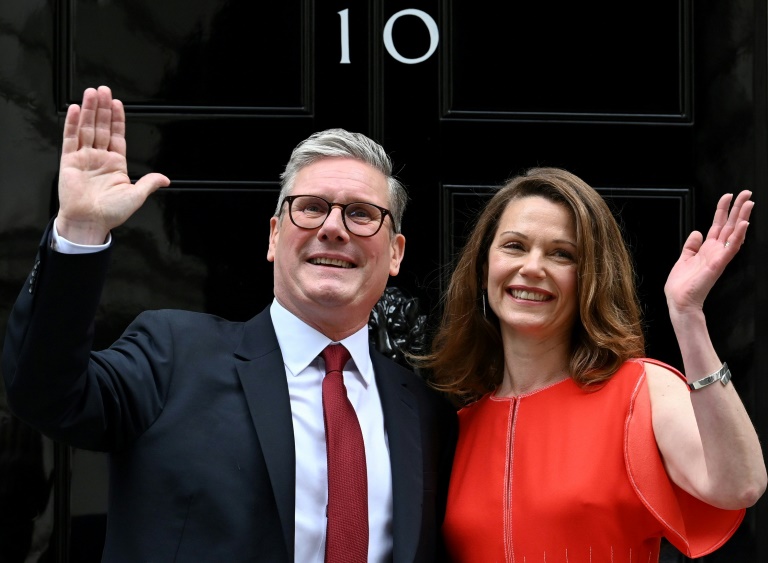
UK'S NEW PM STARMER SPEAKS TO WORLD LEADERS, NAMES TOP TEAM
Keir Starmer set to work as Britain's new leader Friday, speaking with world leaders and appointing his ministerial team after his Labour party's landslide general election victory ended 14 years of Conservative rule.
Starmer named Rachel Reeves the UK's first woman finance minister and appointed David Lammy as foreign secretary following his election win to become centre-left Labour's first prime minister since Gordon Brown in 2010.
Flag-waving crowds of cheering Labour activists lined Downing Street as Starmer pledged to "rebuild" the UK after head of state King Charles III invited him to form a government during a meeting at Buckingham Palace.
"Now, our country has voted decisively for change, for national renewal and a return of politics to public service," the 61-year-old said in his first speech as PM.
"The work of change begins immediately, but have no doubt, we will rebuild Britain."
Within hours, Starmer held a flurry of phone calls with leaders, including reaffirming London's "unwavering" support for Kyiv's war against invading Russian forces with Ukrainian President Volodymyr Zelensky and US President Joe Biden.
He also spoke to European Commission President Ursula von der Leyen, and the prime ministers of Canada, Italy, Ireland and Poland, alongside the heads of the UK's devolved governments in Scotland, Wales and Northern Ireland.
Starmer and von der Leyen "emphasised the importance of the unique relationship between the UK and EU" in addressing shared "challenges", his office said.
Meanwhile, Germany's Chancellor Olaf Scholz told Starmer he would be a "very good, very successful" prime minister in a call.
- 'Sorry' -
Earlier, a sombre Rishi Sunak conceded defeat during a torrid night for his Conservatives that claimed the scalps of at least 12 of his senior cabinet colleagues -- and his predecessor Liz Truss.
Her disastrous 49-day tenure effectively sealed the Tories' fate with the public two years ago, when her unfunded tax cuts spooked markets and crashed the pound.
Before leaving Downing Street for the final time as prime minister, Sunak said "sorry" to the public and revealed that he would step down as Tory leader once formal arrangements for a successor are in place.
The Tories' worst previous election result was 156 seats in 1906. Former leader William Hague told Times Radio this was "a catastrophic result in historic terms".
By late Friday, Labour had won 412 constituencies in the 650-seat House of Commons -- with only one result left to declare -- giving it a majority of 174.
The Tories won just 121 -- a record low -- with the right-wing vote apparently split by Nigel Farage's anti-immigration Reform UK party, which picked up five seats.
In another boost for the centrists, the smaller opposition Liberal Democrats ousted the Scottish National Party as the third-biggest party.
- World reaction -
The results bucked a trend among Britain's closest Western allies, with the far-right in France eyeing power and Donald Trump looking set for a return in the United States.
Ex-president Trump congratulated his admirer Farage on winning election to the UK parliament at his eighth attempt, but noticeably neglected to mention Starmer.
Outside London's busy Waterloo station, 49-year-old engagement officer Ramsey Sargent called it a "momentous election".
"It has been very rocky over the last few months and years. I'm really excited to see what happens next," he told AFP.
Tim Bale, politics professor at Queen Mary, University of London, said the Conservatives' drubbing was "not as catastrophic as some were predicting" and that the Tories would now need to decide how best to fight back.
Brexit champion Farage has made no secret of his aim to take over the party.
"There is a massive gap on the centre-right of British politics and my job is to fill it," he said after a comfortable win in Clacton, eastern England.
Labour's resurgence is a stunning turnaround from five years ago, when hard-left former leader Jeremy Corbyn took the party to its worst defeat since 1935 in an election dominated by Brexit.
Starmer took over in early 2020 and set about moving the party back to the centre, purging the infighting and anti-Semitism that cost it support.
Opinion polls consistently put Labour 20 points ahead of the Tories since Truss's resignation, giving an air of inevitability about a Labour win -- the first since Tony Blair in 2005.
But as the count neared the end, the gap was around 11 percent, with Labour looking set to win fewer votes than it did in 2019, partly reflecting a lower turnout.
Starmer faces a daunting in-tray, from anaemic economic growth to overstretched and underfunded public services and households squeezed financially.
He has promised a return of political integrity, after a chaotic period of five Tory prime ministers in 14 years, scandal and sleaze.
bur-pdh/jj/rlp
2024-07-04T06:26:50Z dg43tfdfdgfd